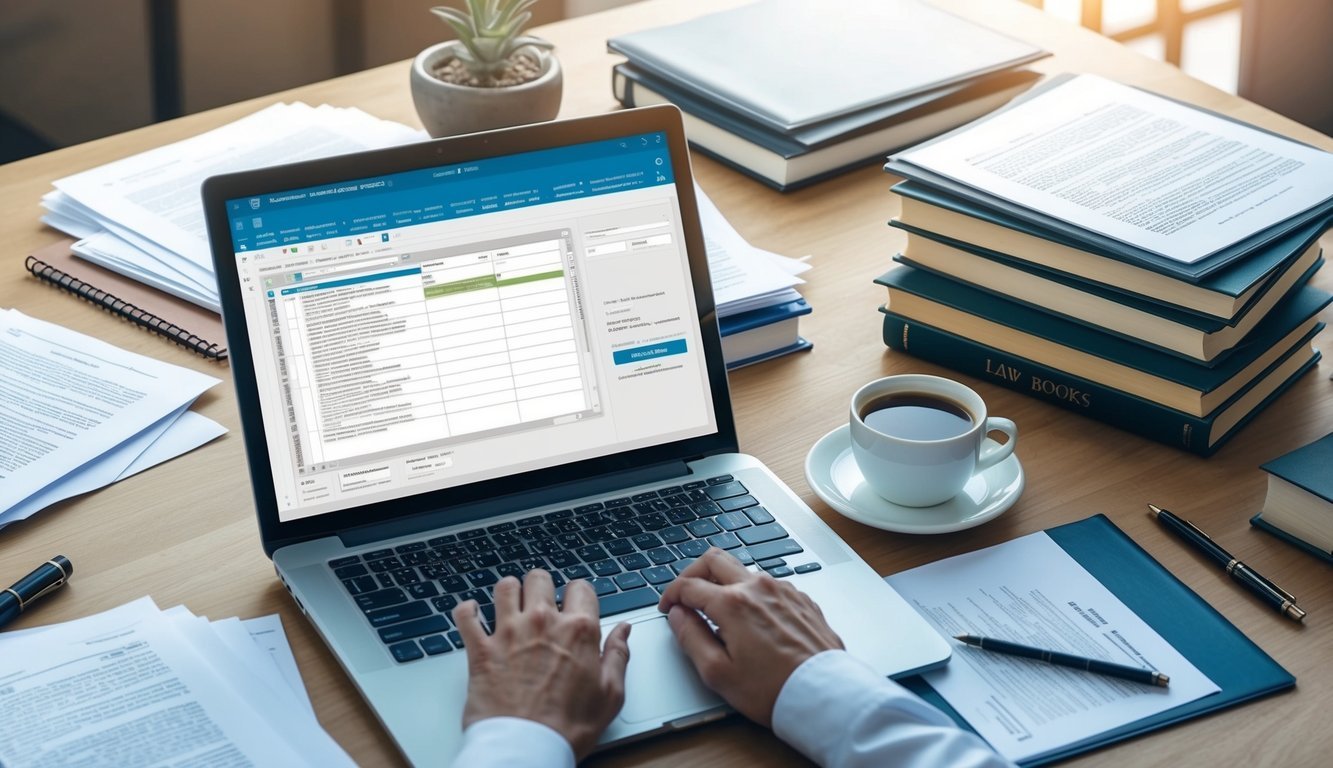Lawyers always need more work, and they can do more than just work at law firms.
A freelance legal consulting side hustle lets attorneys earn more money and get more experience.
As a professional legal consultant, you can earn $55 per hour or more.
Plus, you can work on your own schedule.
This side hustle lets you join the gig economy.
You can offer your legal knowledge to clients who need help but don’t want full-time workers.
You might help startups with contracts, guide individuals through legal issues, or give advice to businesses.
With freelance legal consulting, you can also grow your network and skills.
As you work on different projects, you’ll become known as an expert in many areas.
This can open up new job opportunities or even let you start your own practice later on.
Key Takeaways
- Legal consulting can be a lucrative side hustle with flexible hours and diverse clients.
- You can leverage online platforms and networking to find freelance legal work opportunities.
- Developing niche expertise and embracing technology can set you apart in the competitive legal market.
Exploring the Gig Economy for Legal Professionals

The gig economy offers exciting opportunities for lawyers to diversify their income and gain flexibility.
You can use your legal skills in new ways through online platforms and passive income streams.
The Rise of Freelance Marketplaces
Freelance marketplaces have changed how legal professionals find work.
Now, you can connect with clients worldwide who need your skills.
These platforms let you pick projects that interest you and fit your schedule.
Popular sites like Upwork and Fiverr have sections just for legal work.
You might offer services like:
- Contract drafting and review
- Legal research and writing
- Patent applications
- Trademark filings
The gig economy also lets you build a diverse client base.
You’re not stuck with local work or the usual law firm setup.
This flexibility can lead to higher earnings and a better work-life balance.
Understanding Passive Income Streams
As a legal pro, you have valuable knowledge that can make you money.
This is called passive income, where you earn money without doing much work.
Some passive income ideas for lawyers include:
- Creating and selling legal templates
- Writing and publishing e-books on legal topics
- Making online courses for law students or other pros
- Starting a legal blog with affiliate marketing
These streams can add to your main income or even become your main focus.
You just need to make content that shows off your skills.
Passive income does need a lot of work at first.
But once it’s set up, you can earn money while working on other projects or taking more free time.
Legal Expertise as a Side Hustle
Lawyers can use their skills to make good money on the side.
You can do things like giving legal advice or making educational content for new lawyers.
From Legal Advice to Teaching Law
You can use your legal skills to offer consulting services on a freelance basis.
This lets you work on interesting cases outside your usual work.
You can also try being a part-time professor at a law school or community college.
Teaching law can be fun and pay well.
You might also try tutoring law students online, or giving legal talks to pros in other fields.
Content Creation and Legal Writing
Your legal background makes you a good fit for many writing jobs.
You can start a legal blog where you talk about current legal issues or different areas of law.
Legal magazines also need writers like you.
You can pitch articles to them to make money and build your reputation.
Many businesses also need help with legal writing.
You could write website copy, white papers, or brochures that explain legal ideas to regular people.
You can also write legal textbooks or study guides.
Your experience can help new lawyers and students learn more about the law.
The Art of Legal Transcription and Writing

Legal pros can also make money by doing transcription and writing work.
These jobs let you earn money while using your legal skills.
Becoming a Legal Transcriptionist
As a legal transcriptionist, you’ll turn audio recordings into written documents.
This job needs you to be good with details and know legal words.
As of July 2024, legal transcriptionists in the US make about $23 an hour.
To start, you’ll need to get better at typing and learn how to use transcription software.
You can also take classes in basic law or legal words to learn more about the job.
You can find work on freelance sites or through special transcription companies. TranscribeMe is one place that helps you become a legal transcriptionist.
They have tests and style guides to help you get started.
Crafting Legal Blogs and Ebooks
Your legal knowledge is also good for blogs and e-books.
Start by picking topics you know a lot about.
Then, make content that answers common legal questions.
For blogs, write SEO-friendly articles that help people understand the law.
You can offer your services to law firms or legal sites that need writers.
When writing e-books, think about self-publishing on platforms like Amazon Kindle.
Pick topics that offer useful help, like guides for small business owners or explanations of legal ideas for regular people.
Just make sure to check your work for mistakes.
Your writing should be clear and show off your legal skills.
Digital Platforms for Legal Consulting

Online platforms have changed how lawyers can offer their skills as freelance consultants.
These sites connect legal pros with clients who need special help, making it easier to find work and make more money.
Creating a Presence on Upwork and Upcounsel
Upwork and Upcounsel are two places where you can show off your legal skills.
To stand out, make a profile that talks about what you do and what you’re good at.
Use professional pictures and list any certificates you have.
On Upwork, start with low rates to get good reviews.
Then, you can raise your fees as you get more work.
Upcounsel is just for legal pros, so make sure to show off your special skills there.
Both sites let you bid on jobs or get asked to work by clients.
Make sure to reply fast and do good work to build a good name.
This can get you more work and more chances to show off your skills.
Leveraging Legal Expertise on JustAnswer
JustAnswer is a special place for legal consulting.
As an expert, you can answer legal questions from users and get paid for each answer.
This is a good choice if you like short, different work.
To do well on JustAnswer, you need to answer questions fast.
People on the site want quick help, so you need to be ready.
You also need to give clear answers that help the user.
You can also pick a few areas of law to focus on.
This can help you get more questions and make more money as you build a good name.
Academic Pursuits in Law
Legal pros can also use their skills to teach others.
These jobs let you make money and show off your skills to others.
Transitioning to an Adjunct Law Professor
Being an adjunct professor at a law school is a good side job.
You’ll teach new lawyers and get better at your own skills.
Start by asking local law schools about part-time teaching jobs.
Make sure to talk about your work experience in your application.
Make sure to make fun classes that help people understand the law.
You can teach special classes in your area of law, or teach new lawyers about the basics.
Teaching law courses can also help you meet other legal pros.
This is a good way to make friends and find new work.
Expanding Horizons with LSAT and Bar Exam Tutoring
LSAT and bar exam tutoring are also good ways to make money.
You can use your real-world experience to help students understand the law better.
Start by offering one-on-one tutoring sessions.
You can pick your own hours and rates.
You can also make study guides or practice tests to help your students.
Online platforms make it easy to find students from all over.
You might even make online classes to reach more people.
Just make sure to teach each student in a way that helps them learn best.
Networking and Branding for Legal Advisors

Good networking and branding can make a big difference for legal advisors who want to start a freelance consulting side hustle.
These things can help you get more clients and make better friends in your field.
Public Speaking and Legal Workshops
Public speaking is a good way to show off your skills and meet new clients.
You can offer legal workshops or talks on topics that your clients care about.
Start by asking local groups if they want you to talk at their events.
Make sure to make fun talks about the law that help regular people understand.
You should also have business cards and a short pitch about what you do.
You should also go to networking events and conferences to practice your public speaking.
You can join panels or give short talks at these events.
This can help you meet new friends and get new clients.
Building Authority through Legal Editing and Proofreading
As a legal advisor, you can also make money by editing legal documents.
This job can help you make more money while getting better at your skills.
Start by asking law firms, legal sites, or other writers who work with the law if they need an editor.
You can offer to help them make their work better.
For example, you can:
- Edit legal papers and contracts
- Proofread articles for legal sites
- Review website content for law firms
As you get more editing jobs, think about starting a blog or writing for law sites.
This can help you show off your skills and find new clients.
Make sure to talk about your editing work on your profiles and website.
This shows that you pay attention to details and know a lot about the law.
Starting a Legal Blog and Podcast
Legal blogging is an excellent way to showcase your knowledge and attract potential clients.
Choose a niche topic you’re passionate about and start writing regular posts on current legal issues, case analyses, or practical tips.
To boost your online presence, consider launching a podcast alongside your blog.
This dynamic duo can help you reach a broader audience.
Discuss hot legal topics, interview industry experts, or break down complex legal concepts for your listeners.
Remember to promote your content on social media platforms to increase visibility.
You can use tools like WordPress for blogging and Anchor for podcasting to get started quickly and easily.
Launching Online Courses for Legal Enthusiasts
Creating online legal courses can be a lucrative side hustle.
Identify areas where people often struggle with legal concepts and develop courses to address these needs.
You might create introductory courses on contract law for small business owners or a series on intellectual property rights for creatives.
Platforms like Podia or Teachable make it easy to set up and sell your courses.
Consider offering different tiers of courses, from basic overviews to in-depth masterclasses.
You can also create downloadable resources like templates or checklists to add value to your offerings.
Remember to engage with your students through Q&A sessions or live webinars to build a community around your courses.
Alternative Legal Service Offerings

Expanding your legal expertise into niche services can significantly boost your income.
These specialized offerings cater to specific client needs and provide valuable solutions outside traditional legal practice.
Offering Notary and Mediation Services
As a lawyer, you’re well-positioned to offer notary and mediation services.
Becoming a notary public is relatively straightforward and allows you to authenticate important documents for clients.
This service is in high demand for various transactions.
Mediation is another valuable skill.
You can help parties resolve disputes without going to court.
This process is often faster and more cost-effective than litigation.
To get started, consider taking a mediation certification course.
These services are flexible and can be offered on evenings or weekends.
You’ll build a diverse client base while utilizing your legal knowledge in new ways.
Contract Review as a Freelance Service
Contract review is a lucrative side hustle for lawyers.
Many businesses and individuals need expert eyes on their agreements but can’t afford full-time legal counsel.
You can offer this service remotely, making it ideal for flexible hours.
Start by focusing on specific industries or contract types you’re familiar with.
This specialization will help you work efficiently and build a strong reputation.
Consider creating packages for different levels of review.
For example:
- Basic review for language and clarity
- Comprehensive analysis with suggested revisions
- Custom drafting services
Set clear boundaries on turnaround times and scope of work to manage client expectations effectively.
Harnessing Technology in Legal Research

Legal technology is revolutionizing how freelance legal professionals conduct research, review contracts, and provide tutoring services.
These advancements are making your work more efficient and accurate.
Freelance Legal Researcher Pathways
As a freelance legal researcher, you can leverage powerful digital tools to enhance your productivity. Legal research platforms offer vast databases of case law, statutes, and regulations at your fingertips.
You’ll find AI-powered search functions that help you quickly identify relevant precedents and legal arguments.
These tools can analyze patterns in judicial decisions, giving you valuable insights.
Consider using citation services to ensure your work is up-to-date and accurately referenced.
Many platforms now offer real-time updates on new cases and legislative changes, keeping you informed.
Effective Tools for Contract Reviewers and Tutors
If you’re a contract reviewer or legal tutor, technology can significantly boost your efficiency. Contract review software uses AI to scan documents for potential issues, saving you time and reducing human error.
You can utilize digital collaboration tools to work seamlessly with clients or students.
Video conferencing platforms enable you to provide tutoring services remotely, expanding your reach.
For tutoring, interactive learning management systems can help you create engaging content and track student progress.
These tools often include features like quizzes and discussion forums to enhance the learning experience.
Lifestyle and Work-Life Balance for Legal Freelancers
Legal freelancing offers unique opportunities to shape your professional and personal life.
You can tailor your schedule, choose your projects, and pursue interests outside of law.
Finding Equilibrium between Practice and Side Hustles
As a legal freelancer, you have the freedom to explore various side hustles alongside your primary practice.
You might consider real estate investing, food delivery, or dog walking to diversify your income streams.
These activities can provide a refreshing change of pace from legal work.
Balancing multiple gigs requires careful time management.
Create a structured schedule that allocates specific hours for your legal work and side hustles.
This approach helps prevent burnout and ensures you meet all your commitments.
Remember to prioritize your legal clients.
While side hustles can be exciting, your expertise as a lawyer remains your most valuable asset. Freelance legal work should take precedence when scheduling your time.
Harnessing Flexibility for Personal Pursuits
The flexibility of freelance legal work allows you to pursue personal interests and maintain a healthy work-life balance.
You can design your workday around your most productive hours, whether you’re an early bird or a night owl.
Take advantage of this flexibility to engage in hobbies, spend time with family, or travel.
Some legal freelancers even become Airbnb hosts, combining their love for travel with an additional income source.
Regular exercise and self-care are crucial.
Block out time in your schedule for physical activity, meditation, or simply relaxing.
This investment in your well-being will boost your productivity and job satisfaction.
Don’t forget to set boundaries.
Just because you can work anytime doesn’t mean you should.
Establish “off” hours and stick to them to avoid work creeping into your personal time.
Frequently Asked Questions
Starting a freelance legal consulting side hustle involves navigating legal requirements, finding opportunities, and leveraging your skills effectively.
These FAQs address key considerations for lawyers and paralegals looking to expand their income through consulting work.
How can I start a freelance legal consulting side hustle with no prior experience?
Begin by identifying your niche legal expertise.
Create a professional online presence showcasing your knowledge.
Start small by offering pro bono services to gain experience and testimonials.
Network with other professionals and join legal associations to find potential clients.
Consider partnering with experienced consultants to learn the ropes.
What are the legal requirements for lawyers to engage in side hustles?
Check your state bar association’s rules on outside employment.
Many require disclosure to your primary employer.
Ensure you maintain client confidentiality and avoid conflicts of interest.
Obtain proper insurance coverage for your consulting work.
Keep detailed records of your side hustle income for tax purposes.
What platforms are best for finding freelance legal consulting opportunities?
JustAnswer and LiveAdvice offer platforms for lawyers to answer legal questions.
LinkedIn can be valuable for networking and finding consulting gigs.
Upwork and Freelancer.com sometimes feature legal consulting opportunities.
Specialized legal job boards like LawCrossing may also list freelance positions.
How can paralegals leverage their skills for side hustles from home?
Paralegals can offer virtual assistance to law firms or solo practitioners.
Document preparation, legal research, and case management are valuable services.
Consider creating legal templates or guides for small businesses.
Offer training or workshops on legal software or procedures to other paralegals or law firms.
What strategies can lawyers use to generate passive income on top of their practice?
Create and sell legal courses or webinars on platforms like Udemy.
Write and publish e-books on legal topics relevant to your expertise.
Develop legal templates or contract packages for sale on legal marketplaces.
Consider affiliate marketing for legal software or services you regularly use and recommend.
What types of legal services are in highest demand for freelancing consultants?
Contract review and drafting are consistently in demand.
Intellectual property consulting, especially for startups, is a growing field.
Forensic legal consulting is a niche area with increasing opportunities.
Compliance and regulatory advice are also sought after, particularly in industries facing frequent legal changes.


